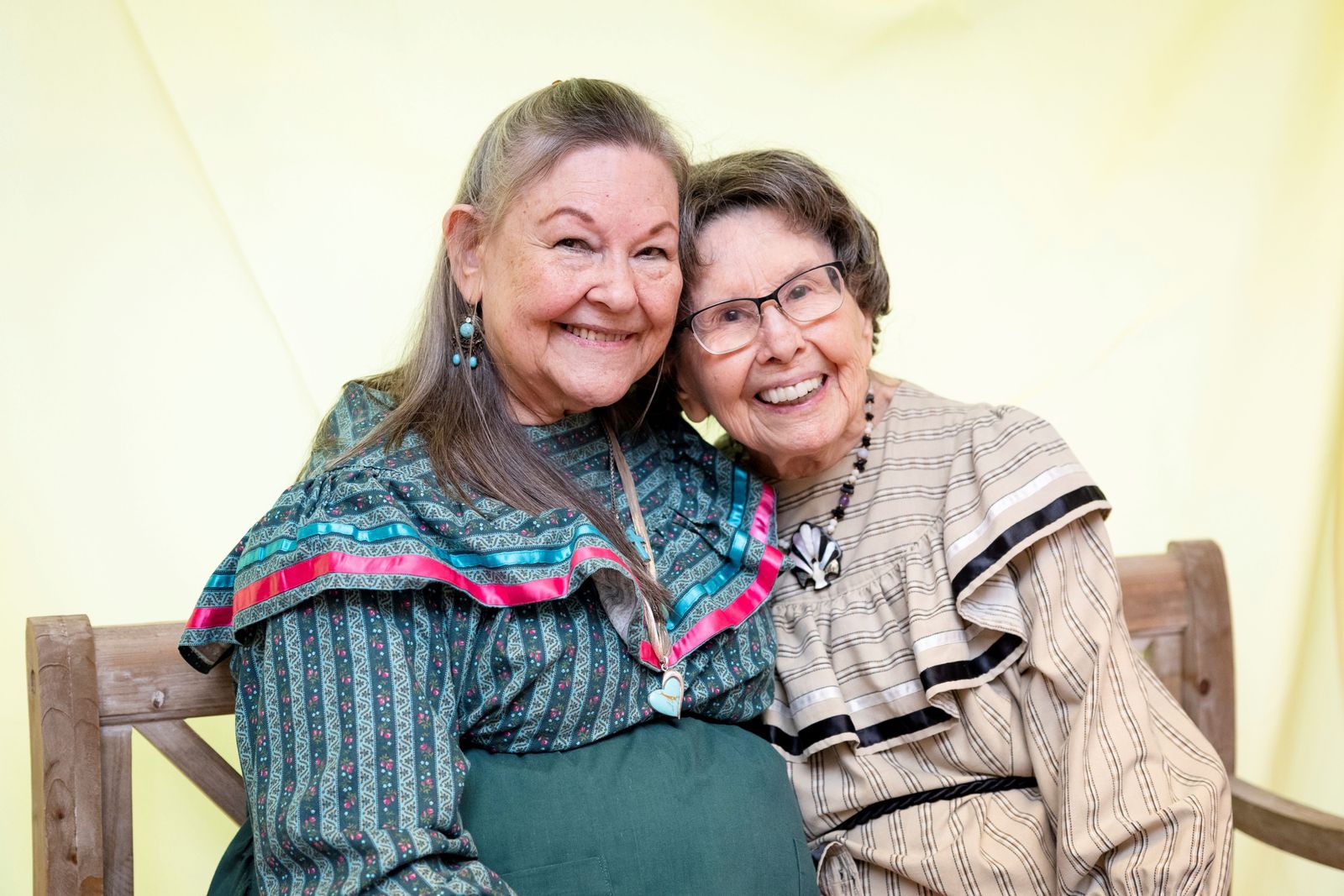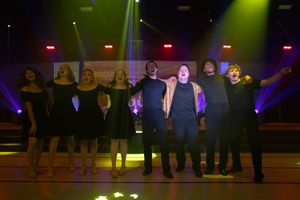THACKERVILLE, Okla. – Chickasaw women from all walks of life gathered to learn, uplift one another and celebrate their community during the 2023 Chickasaw Nation Dynamic Women Conference, conducted June 1-2 at WinStar Resort and Convention Center.
With a theme of “Embracing Our Community,” and featuring vibrant art and a positive atmosphere, attendees learned valuable lessons on ways to build stronger communities.
Chickasaw Nation Governor Bill Anoatubby’s introduction of Nancy Howell as 2023 Chickasaw Nation Dynamic Woman of the Year was one of the highlights of the annual conference, which drew Chickasaw women from across the country.
Howell, a first responder instructor from Central High, Oklahoma, was selected for the award for her service to the community.
“The Chickasaw Nation has been blessed with numerous talented and selfless women whose contributions have helped shape and strengthen the course of our tribe and our country,” Governor Anoatubby said. “From the earliest pioneers to the trailblazers of today, we are thankful for the many dynamic women we have in the Chickasaw Nation.”
The two-day conference featured presentations, panel discussions, breakout sessions and fellowship.
Tobi Edwards Young, 2022 Chickasaw Nation Dynamic Woman of the Year, delivered the keynote address. An attorney and human rights activist, Young said she believes she was led to pursue public service and law by her father’s lessons on Chickasaw culture and the perseverance and resilience of the Chickasaw people.
“The law is a very powerful tool; it is a power for good. The law is supposed to represent a community’s values. It is supposed to speak for its people. When you have laws that are truthful and represent the people and are moral, you have predictability. You have stability and lawmakers accountable to the people. And when that happens, people flourish. The arts flourish, the culture flourishes.
“The Chickasaws are emblematic of this principle. Look at how this community has flourished,” Young said.
Appointed a U.S. Supreme Court clerk by Justice Gorsuch, Young was the first enrolled citizen of a First American nation to serve in the position.
She said it is her obligation to ensure other First Americans follow her path.
Throughout serving in several government and regulatory roles, she hopes to serve not only as an inspiration to other Chickasaw women, but to all who wish to dedicate their life to public service.
“What I have found is, it’s not about me. It is an opportunity for me to share who I am and where I come from, about the Chickasaws,” Young said. “It’s just been a blessing to me to share my life and my heart.”
Young received her law degree from the University of Mississippi after graduating from Dartmouth College and George Washington University. With more than 25 years of experience in government, Young currently serves as senior vice president for corporate and regulatory affairs at Cognizant Technology Solutions. She is also a director of the Cognizant Foundation and serves on the Halliburton board of directors.
Embracing Community
Chickasaws Anoli Scott, Julie Morgan and Carrie Johnson kicked off the conference with a Next Generation panel moderated by Brittney Morton. The young ladies discussed the importance of their generation connecting and staying involved in the Chickasaw community.
“I think a community is a place that a purpose for self is found, and this purpose can impact said community,” Johnson, a 21-year-old media studies student at Austin College, Sherman, Texas, said. “It is important for young people to be involved in the (Chickasaw) community because it gives you a more deeply rooted connection with your cultural identity.”
Morgan defined community as a support system which creates a sense of belonging and grounds a person to maintain their true self. Morgan graduated with distinction in May 2023 from the University of Oklahoma (OU), Norman, Oklahoma, with a bachelor’s degree in economics and supply chain management.
Scott said her definition of community is family, church and her tribe. She also spoke of her generation’s responsibility to maintain the Chickasaw culture.
“We are the future. We need to carry on the traditions passed down from our ancestors. If we stop taking those into consideration and we lose the importance of who we are, we lose our culture, and our culture is part of our identity. We can look to our elders and our parents and stay engaged. As young people it is our mission to carry on who we are as Chickasaw people.”
Scott is a senior at OU, as well as a contracted cadet in the U.S. Air Force.
All three young ladies said they stay connected to the Chickasaw Nation through the Chickasaw Times, tribal social media platforms and website, and connection groups at their universities.
Jenny Loksi Davis, Ph.D., presented “Embracing Our Communities Through Our Language” sharing her experience assisting several tribal nations in establishing language revitalization programs.
Through this work, the Chickasaw citizen said, she is able to share some of the ways the Chickasaw Nation has worked to establish programs to protect the language, such as language immersion programs.
Davis is an associate professor of anthropology and American Indian Studies at the University of Illinois, Urbana – Champaign, where she is also director of the American Indian Studies Program and co-director of the Center for Indigenous Science.
During the “Embracing our Culture” panel, Sonya Scott- Frazier, Eldrena Douma and Karen Reveles discussed the many facets of a community. Moderated by Nicole Schultz, the ladies discussed ways to create a community, benefits of community and projects to strengthen a community.
Scott-Frazier compared the concept of a community to the Three Sisters story. “When planted together, through their unique abilities, they share and commit to their community. Each person supports each other, everyone plays a role,” she said.
Scott-Frazier is of Choctaw and Chickasaw ancestry. She created two organizations important to her spiritual healing – the Oklahoma Indigenous Nurses Association and the Regalia Making Relatives.
Reveles explained how creating a space within college campuses for First American students to call home is an important aspect of fostering a community. A Chickasaw citizen, Reveles serves as recruitment and retention manager for the Chickasaw Nation Department of Education, which empowers Chickasaw college students for success with on-campus resources at five Oklahoma colleges.
Douma spoke of the importance of adapting to the community where one lives. A full-time storyteller, Douma’s family and tribal communities of the Laguna, Tewa and Hopi were instrumental in the foundation of who she is today.
A former public school teacher, Douma has a bachelor’s degree in elementary education and a master’s degree in early childhood education. She shared creative tips for connecting with and teaching young children in her presentation “Eiderdown Voices.”
Hymns sung by the Native Praise Choir during lunch on the last day of the conference were particularly impactful to first-time attendee Chickasaw Davina Kniffin, of Burleson, Texas.
“It all boils down to Christianity,” Kniffin said. “The speakers, guests and employees are all kind, all wonderful. It is a God thing. I am glad to see women getting uplifted because of Governor Anoatubby’s leadership. This is a wonderful conference. I won’t miss another one.”
Kniffin said she did not learn she was a Chickasaw citizen until later in life. She now shares the Chickasaw culture with her 6-year-old granddaughter, who is learning the Chickasaw language through the Chickasaw Nation Martial Arts program.
In conjunction with the conference, artwork showcasing the “Art of the Chickasaw Woman” was exhibited at the convention center. Lisa Johnson-Billy, chairperson of the Chickasaw Nation Legislature, served as master of ceremonies both days of the conference.
For more information about the Dynamic Women Conference, visit Chickasaw. Net/DynamicWomen or call (580) 272-5520.


